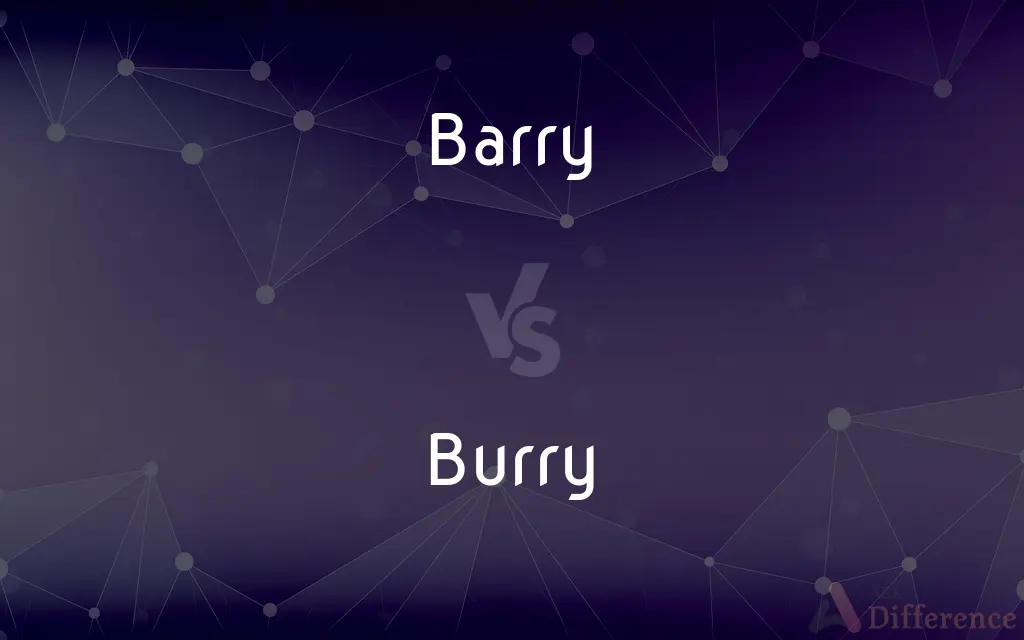Barry vs. Burry — What's the Difference?
By Tayyaba Rehman — Updated on September 24, 2023
Barry is primarily a proper name or a heraldic term referring to a field divided by parallel lines, while Burry is an adjective describing something covered with or containing burrs.

Difference Between Barry and Burry
Table of Contents
ADVERTISEMENT
Key Differences
Barry and Burry differ significantly, as one is primarily a proper noun or a heraldic term, while the other is an adjective describing a specific physical characteristic. Barry is often used as a given name, representing an individual's identity, and holds no descriptive quality about physical attributes or states. It is also a term in heraldry where it denotes a shield that has been divided into an even number of parallel lines.
On the other hand, Burry is used to describe objects or surfaces that are covered with or contain burrs—small, hook-like or pointed projections. It conveys the physical appearance or texture of an item, often indicating that caution is needed when handling such an item to avoid discomfort or injury due to the burrs.
Barry, in its use as a heraldic term, refers to symbolic representations on a shield or coat of arms and is steeped in tradition and symbolism, with no implication of texture or physical discomfort. It's a term strictly adhering to heraldic conventions, specifying the appearance and arrangement of lines on heraldic shields.
Conversely, Burry gives a direct, tangible description of an item’s surface characteristic, usually implying a rough or prickly texture. This word is applied in everyday language, representing a real and tangible characteristic of objects and implying a sense of touch and feel, rather than abstract symbolic representation.
In conclusion, Barry is related to names and symbolic representation in heraldry, with no descriptive quality regarding texture, while Burry directly describes the physical state or characteristic of objects, indicating the presence of burrs and implying texture and touch.
ADVERTISEMENT
Comparison Chart
Part of Speech
Proper noun, Noun (in heraldry)
Adjective
Definition
A given name or a heraldic term.
Covered with or containing burrs.
Usage Context
Names, heraldry.
Describing texture and appearance of objects.
Implication
Identity, symbolic representation.
Physical characteristic, roughness, prickliness.
Related Words
(In heraldry) Paly, Bendy.
Prickly, Spiky.
Compare with Definitions
Barry
A division of a shield containing several parallel lines.
The coat of arms features a silver and blue barry.
Burry
Characterized by the presence of small, rough projections.
The burry seeds easily attached themselves to our clothing.
Barry
A male given name.
Barry is known for his excellent culinary skills.
Burry
Covered with burrs; having a rough or prickly texture.
The burry surface of the plant can cause skin irritation.
Barry
A term used in heraldic descriptions to denote parallel lines.
The knight's emblem was marked with a golden barry against a black background.
Burry
Prickly, causing discomfort due to burrs.
The burry branches scratched my arms as I passed through the shrubs.
Barry
A surname.
Michelle Barry is a renowned historian.
Burry
Containing many burrs.
The fabric was burry and uncomfortable against the skin.
Barry
In heraldry, a field divided into an even number of parallel pieces.
The family shield is barry of six, red and gold.
Burry
Having a texture that can cause discomfort or injury.
Be careful while walking through the burry field.
Barry
(heraldry) A field divided transversely into several equal parts, and consisting of two different tinctures interchangeably disposed.
Burry
Burry is a surname.
Barry
(heraldry) Traversed (transversely) by bars.
Burry
Having burs; prickly.
Barry
Excellent.
Burry
Abounding in burs.
Burry wool
Barry
Divided into bars; - said of the field.
Burry
Characterized by a burr.
Burry
Abounding in burs, or containing burs; resembling burs; as, burry wool.
Burry
Having or covered with protective barbs or quills or spines or thorns or setae etc.;
A horse with a short bristly mane
Bristly shrubs
Burred fruits
Setaceous whiskers
Common Curiosities
Is Barry usually a proper noun?
Yes, Barry is primarily used as a proper noun, either as a given name or a surname.
Can Burry be used to describe texture?
Yes, burry describes the texture of objects, typically indicating a rough or prickly surface due to the presence of burrs.
Does Barry have implications in heraldry?
Yes, Barry is used in heraldry to denote shields divided into an even number of parallel lines, following specific heraldic conventions.
Does Barry have descriptive qualities about physical states or attributes?
No, Barry as a name does not have descriptive qualities, and as a heraldic term, it represents symbolic divisions on shields but doesn’t describe physical states or textures.
Can Barry refer to a heraldic term?
Yes, in heraldry, Barry refers to a field divided by even-numbered parallel lines.
Is Burry a common adjective for describing plants?
Yes, burry is often used to describe plants that have rough, prickly surfaces or are covered in burrs.
Can Burry be related to the idea of roughness?
Absolutely, burry implies roughness due to the presence of burrs.
Is Burry associated with discomfort?
Yes, objects described as burry can cause discomfort due to the presence of small, rough, or prickly projections.
Does Barry symbolize identity?
As a name, yes, Barry symbolizes an individual’s identity.
Is Barry used in everyday language to describe texture?
No, Barry does not describe texture; it’s primarily a proper noun or used in heraldry.
Is Burry related to the presence of burrs?
Yes, burry typically describes surfaces or objects covered with or containing burrs.
Can Burry describe the appearance of fabrics?
Yes, fabrics can be described as burry if they have rough, prickly surfaces or contain burrs.
Does Burry imply a sense of touch and feel?
Yes, burry implies a tangible characteristic often associated with a rough or prickly texture, indicating a sense of touch and feel.
Can Barry be a surname?
Yes, Barry can also be used as a surname.
Can Barry imply any physical characteristic or discomfort?
No, Barry does not imply any physical characteristic or state of discomfort, as it is primarily a proper noun or a heraldic term.
Share Your Discovery

Previous Comparison
Slat vs. Slot
Next Comparison
Eskimo vs. InuitAuthor Spotlight
Written by
Tayyaba RehmanTayyaba Rehman is a distinguished writer, currently serving as a primary contributor to askdifference.com. As a researcher in semantics and etymology, Tayyaba's passion for the complexity of languages and their distinctions has found a perfect home on the platform. Tayyaba delves into the intricacies of language, distinguishing between commonly confused words and phrases, thereby providing clarity for readers worldwide.













































